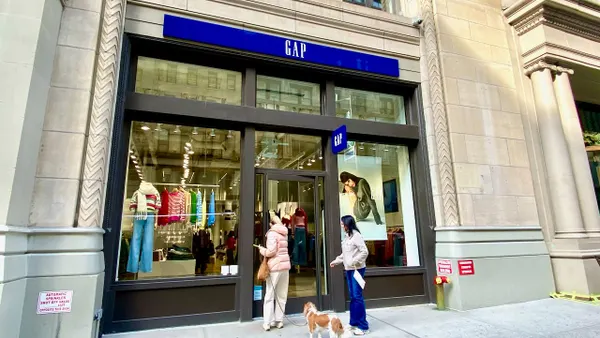Dive Brief:
- Toys R Us was in "advanced talks" with private equity firm Sycamore Partners earlier this year before the bankrupt toy seller requested court approval of a plan to wind down its U.S. business, according to a Bloomberg report that cited unnamed sources familiar with the matter. Toys R Us declined to comment to Retail Dive.
- The deal would have kept open about half of Toys R Us' 800 domestic stores, but talks fell apart because the toy retailer's creditors expected larger returns from liquidating the company, according to the Bloomberg report.
- Target also talked with Toys R Us about acquiring assets from the Babies R Us unit, including its parent registry and website. Those talks collapsed for the same reasons: lenders saw more value in a liquidated company. Attorneys for Toys R Us said in court papers in March that the company had pursued potential buyers and investors, but no deal materialized as a result. Bloomberg's report is the first to note Sycamore and Target by name.
Dive Insight:
Bloomberg's report is perhaps the clearest indication so far that there were outsiders who saw significant value in Toys R Us as an operating — if much smaller — retailer. And it confirms again a cold truth about bankruptcy: a company's secured lenders often call many of the shots, including the fate of the company.
In other words, Toys R Us isn't shutting down now for lack of interest in the company's continued existence.
Toys R Us attorneys said in court papers earlier this year that the retailer tried to save its U.S. business by searching for a buyer. By mid-March, Toys R Us and its representatives had reached out to 40 parties about an investment or buyout, ten of whom signed non-disclosure agreements, indicating some interest.
But to keep even 400 stores open in the short-term, Toys R Us would have needed a capital infusion of "several hundred million dollars" or it would have run out of cash by May. A group of Toys R Us lenders determined that "the best way to maximize their recoveries is to liquidate" the retailer's stores and domestic operations, attorneys said in March.
Now it seems that Toys R Us had real interest from a viable buyer. Sycamore has been snapping up distressed and struggling retailer's over the years, most recently Staples. It also owns Belk, Hot Topic, Talbots, The Limited and Nine West, among others.
The private equity firm wasn't necessarily the last hope for saving some fraction of Toys R Us' stores, but options are closing and time is running out. Toy mogul Isaac Larian recently dropped his bid for more than 200 Toys R Us stores in the U.S. after pushing for months to make some kind of deal for a portion of the retailer.
The investment fund that bought Toys R Us' Canadian unit has also reportedly expressed interest in operating some U.S. stores. There have also been rumors and unconfirmed reports that Jerry Storch, who did a stint as CEO of Toys R Us before leaving for Hudson's Bay, could be interested in keeping some stores alive.
Auctions for Toys R Us' intellectual property and remaining real estate assets are approaching. They present an opportunity for an interested buyer to piece together some reconfigured version of Toys R Us, perhaps one with a digital footprint. In doing so, it could join numerous retailers that have fallen in bankruptcy only to reemerge in some form through IP sales.
Just how, if at all, Toys R Us emerges out of liquidation depends on several factors, most of them relating somehow to money. As we've seen with both Toys R Us and Bon-Ton, good-intentioned efforts to keep a storied retailer alive can run into the hard logic of finance and bankruptcy law.













